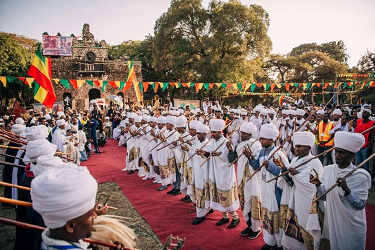Ethiopians today colorfully celebrate Timkat (Ethiopian Epiphany), the annual holiday that remembers the Baptism of Jesus Christ and opening of Heaven.
In the capital, Addis Ababa, and the historic City of Gondar in Amhara Region of Ethiopia, Timkat is being celebrated today colorfully. Timkat is a beautiful ecclesiastical tradition of celebrating on the open water with traditional canoes carrying the wonderfully colorful procession to the Ketera site.
Across the country and by the Ethiopians in the diaspora, Timket is celebrated by all Ethiopian Orthodox Church followers colorfully every year. In 2019 Timkat is inscribed by the UNESCO (United Nations Education, Science and Cultural Organization) as intangible heritage – Ethiopian Epiphany.
In addition to Orthodox Christians, Catholic Religion followers in Ethiopia also celebrating Timket today colorfully.

During Timkat celebration, the commemoration of Baptism of Jesus Christ in Jordan River and opening of Heaven starts on the eve of the main festival on 18 January.
The eve is known as Ketera, which means blocking the flow of water for the blessing of the celebrants. On the eve of Ketera, people escort their parish church tabot (replicas of the Ark of the Covenant) to Timkete-Bahir (a pool, river or artificial reservoir), transported by a priest of the parish and accompanied by a great ceremony.
It is a great honor to be in Gondar, the city of patriots where all the citizens are welcome and feels at home. I am to experience one of the most memorable celebration of ጥምቀት (Timket) or Epiphany in Ethiopia. pic.twitter.com/Y6C52N6iVx
— Obang Metho (@ObangMetho) January 19, 2022
The people spend the night attending night-long prayers and hymn services, including the Eucharistic Liturgy. Hundreds of thousands participate in the actual festival on the following day – 19 January. The celebration starts early in the morning with pre-sunrise rituals. These are followed by the sprinkling of the blessed water on the congregation, as well as other ceremonies.
At around 10 a.m., each tabot begins its procession back to its respective church, involving an even more colorful ceremony with various traditional and religious songs. The viability of the element is ensured through its continued practice, with Orthodox clergies playing a pivotal role: they sing the praises dedicated to the rituals and hymns, carry the Ark, and preach relevant texts, according to UNESCO.
